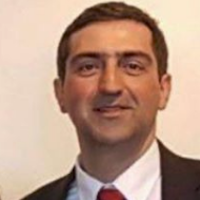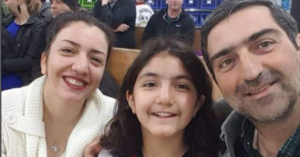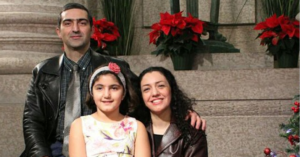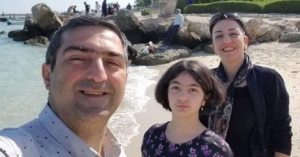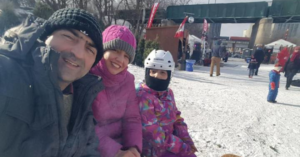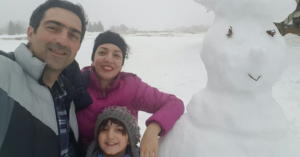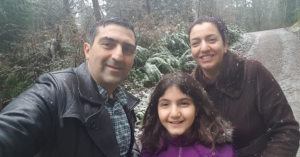Mirmohammadmehdi Sadeghi
An Empty House in Winnipeg
We were a family of three flying back to Winnipeg on that flight. No one has the heart to visit our house in Winnipeg, and the house remains as it was the day we left it. There is a park in front of the house where Anisa used to run and play around. There is a yard in that house that could host our family of three’s breakfasts. All those things are still there, but we…
Mir Mohammad Mahdi, whom everyone called Mehdi, was born in 1976 at Sina Hospital in the city of Tabriz, in northwestern Iran. He grew up in a middle-class and average family, the father was an employee of the National Bank, and the mother worked as a teacher. Three children were born in their household, Zahra, Mehdi, and Maryam. Mehdi was the middle child.
Bahareh was born in Hamedan, western Iran, in December 1978. She was also born in an
average family. A hardworking student who studied in Farzanegan schools1, scored among the top contestants of Iran’s national university entrance exam and was consequently admitted into the civil engineering program of Tehran University.
Mehdi and his family lived in different cities in Azerbaijan and northeastern Iran, depending on where his father’s job took them. They lived in such cities as Selmas, Tabriz, and Zanjan. The native city of his parents was Khoi, where he is remembered by the summers and sunflowers of that city. He was also a talented student who was accepted into the field of photogrammetry engineering at the University of Tehran.
Mehdi and Bahare met in Tehran in 2000 while master’s students at Construction Management program. Mehdi had worked in a dam and road construction company for years, but his passion for studying and learning had brought him back to the university, a passion shared by Bahareh as well.
They got married in October 2003. Bahare used to travel to Shush, in southern Iran, where she was a professor at Shush University. At the same time, she was working for construction companies. The latter was Mehdi’s career too. After some time, they moved to Qazvin and settled down in Qazvin (150KM northwest of Tehran). Bahareh was a project manager at Qazvin Regional Water Company, and Mehdi, using the vast experience he had accumulated in the field, was leading his own construction projects. The birth of their daughter, Anisa, in 2008 made their lives hundredfold happier.
I am Anisa, a happy girl who likes songs and music. At the age of 4, I used to read the poems of Hoshang Ebtehaj, a contemporary Iranian poet. I know Iranian folk dances, and I used to fascinate everyone with my artistic performance at weddings in Iran. My mother plays the tambourine and writes poetry. Sometimes she dips a piece of wood in black ink and, on a paper, draws shapes which she says are Hafez’s poems. Hafez must be a good person who knows poetry. Mom sings his poems to me, which is hard to understand, but I like their rhymes and rhythms.
I am Anisa. When they ask me what my favourite craft and skill is, I reply, “only Taekwondo”!. During the three years I was in Canada, I achieved one Taekwondo belt after another. During my short trip to Iran that fall, I taught my grandparents and aunts some exercises and encouraged them to exercise.
I am Anisa, a member of a family of three that is no more. I was running in that yard. In the evenings, I would hold mom and dad’s hands and take them to the park to wait and see the brown dog again. I am very fond of pets and had kept pets since I was a younger child.
I play guitar. I speak Persian, French, and English. When my cousin, who is in Vancouver, starts to cry, I connect on WhatsApp and play guitar and sing for him. I am careful not to let my hair fall in front of my eyes.
I am Anisa. I am a member of a family of three who went to Iran to see my grandparents who told me how much I had grown up. I kept everyone busy with my charm and tricks.
I like Iran. I realized that from watching the musical series, Auntie Roach Hashtag. On weekends, I attend a Persian language class in Winnipeg. Mom and Dad also come with me and teach Persian as volunteers, although they are both civil engineers. Mom builds tall buildings. The director of Marwest Management Canada, Mom’s last employer, wrote in her memory that “Bahareh was calm and was always wearing a smile. She was very talented and competent. She was an absolute gem of a human being.”
Dad builds tall buildings and travels to colder and more distant cities, but he does not get tired and still maintains his smile. I ask Dad: “isn’t the ground scary from the top of the tall buildings?” Dad laughs and says: “The brown dog is coming today, Anisa. Shall we go to the park? Don’t you want to be a veterinarian”? Then the three of us go to the park. And since the brown dog doesn’t show up that day to make a veterinarian out of me, we go back home. I miss home, and I like to flip through Mom and Dad’s wedding album and ask, “Mom, why am I not in the photos”?
We lived in Canada for three years. There were not many Iranians in Winnipeg. We were by ourselves. Just the three of us. It snowed during three winters. Three summers came and went. I celebrated my tenth birthday last fall (2019). But we did not see the fourth snow season. When on board of the plane, mom told me that if I close my eyes, we will arrive in Winnipeg in the blink of an eye. I closed my eyes and heard as the plane took off.
1 Farzanegan Schools are girls-only schools across Iran administered under the National Organization for Development of Exceptional Talents. The schools, which include middle school and high school, are part of gifted and talented schools in Iran. (Source: Wikipedia)
No sound file available.
